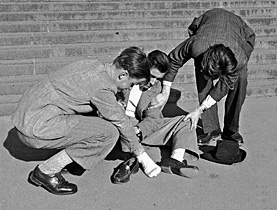
Remember the bad and not the good

It's easier to recall the time the airline lost your luggage than a Christmas gift from last year because remembering bad events over good ones helps us evolve.
That is the finding of a theoretical biologist at Bern University who studied how populations grow based on how much weight individuals place on positive versus negative experiences.
“We don’t want to make any moral statements because this is just a computer model that offers a very simplified view of the world,” said Daniel Rankin, lead author of a study published in the journal Proceedings of the Royal Society on Wednesday.
“But you should remember bad things, acts of not helping, much more than helping.”
Rankin says that’s because forgiving organisms tend to get weeded out of a population after thousands of generations. Those that are more prone to remembering bad events tend to survive and reproduce.
Rankin cautions, however, that the study is no excuse for giving up on cooperation and embracing a life of selfishness.
“It might be nice to remember these goods acts for your social survival,” he added.
Classical problem
Evolutionary biologists have long wrestled with understanding why organisms will go out of their way to cooperate and help each other, especially when there is no guarantee a kind act will be reciprocated.
While scientists have already shown people with helpful reputations tend to get helped in return, Rankin’s study sought to determine how those reputations form.
To do that, Rankin had to create an evolutional algorithm that could simulate organisms interacting with each other. Some were programmed to remember good acts more readily while others remembered bad acts more readily.
Evolutionary biologists, much like businessmen or economists, look at the world in terms of costs versus benefits. Instead of profits, however, the biological payoff is survival and reproduction.
Rankin used a computer to let these “mathematical organisms” interact for 25 rounds, after which he looked at those that had racked up the most benefits for the lowest price. Those winners continued onto the next generation while the losers were eliminated. He repeated the process 2,500 times.
“What we found is that you should put more weight on bad reputations – acts of not helping – because those that favour good reputations were selected against,” he said.
“The best strategy is to be less forgiving. That’s how I think of it.”
Economic implications
While Rankin is quick to say the study should not have moral undertones, it does have implications for the business world.
In the course of the experiment, he referred to a study completed by William Beinecke, a finance professor at the Yale School of Management in the United States.
In that study, Beinecke looked at book reviews that readers posted on Amazon.com and Barnesandnoble.com. He found that book sales were disproportionately affected after a negative review compared with positive ones.
The same concept could apply to customer service or sales and marketing staff, said Rankin, who now works for Zurich University.
“If you have one bad experience, let’s say you eat an off burger at a restaurant, that will affect you much more than if you had had a good burger,” he said.
“I think most people are quite stubborn like that. They say, ‘Ok, I’m never going back to that restaurant or I’m not going to fly with that airline anymore’ after one bad experience.”
His study suggests why: It is in our evolutional interests to hold those grudges.
Rankin notes that for some reason the same concept does not seem to apply to politics.
“Disgraced people can get appointed to cabinet positions again and again,” he said. “The collective memory there seems to be shorter.”
swissinfo, Tim Neville
The model Daniel Rankin used is based largely on the idea of game theory, a complex mathematical technique used to help make strategic decisions based on the decisions of others.
The theory applies to situations like this: John Doe has two choices for getting to work. He can take the train or he can drive. If the entire city drives, the streets will be jammed, so John should take the train. If the entire city takes the train, the streets will be free, so John will get to work more quickly if he drives.
The same idea plays out in evolutional biology since behaviour that any organism displays depends on what is happening in the environment – not just the climate but also what other organisms in the population are doing. Game theory in evolutional biology attempts to find the best strategy to ensure average survivability and reproduction.
Rankin explains how this idea unfolds in his study.
“If I choose to help you, and no one sees it and there are no repercussions for me, the best thing for me to do is to not help you,” he said.
“As soon as you introduce observation and reputation, what I’m doing depends on what everyone else is doing, so it’s in my interests potentially to cooperate.”

In compliance with the JTI standards
More: SWI swissinfo.ch certified by the Journalism Trust Initiative




























You can find an overview of ongoing debates with our journalists here . Please join us!
If you want to start a conversation about a topic raised in this article or want to report factual errors, email us at english@swissinfo.ch.